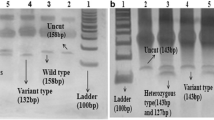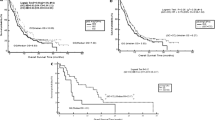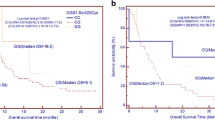Abstract
Xeroderma pigmentosum complementation group C plays an important role in the human repair system. As reported in previous studies its polymorphism are associated with lung cancer susceptibility. The purpose of this study is to investigate the association of XPC gene with lung cancer susceptibility, overall response and clinical outcomes amongst North Indians. A hospital based study of 370 lung cancer cases and 370 healthy controls was conducted and genotypes were determined using PCR-RFLP assay. Results were assessed using logistic linear regression adjusted for age, sex and smoking status. Survival analysis was conducted using Kaplan-Meier survival analysis and Cox regression analysis. The treatment outcomes of 167 lung cancer patients treated with platinum based chemotherapy were evaluated.The mutant genotypic variant of XPC Lys939Gln has been associated with elevated risk of lung cancer(OR:2.30;95%CI:1.41-3.73;p=0.0007) whereas XPC Ala499Val showed a highly protective effect (OR:0.25;95%CI:0.10-0.63;p=0.003). The mutant genotype of XPC Lys939Gln presented a higher risk of developing lung cancer in heavy smokers (OR: 3.71; 95%CI:1.46-9.45; p=0.005). The survival analysis presented that heterozygous genotype showed least survival in comparison with mutant genotype in XPC Ala499Val genetic variant whereas no significant association was observed in XPC Lys939Gln. In conclusion, XPC Lys939Gln is associated with significant risk towards the lung cancer whereas on contrary XPC Ala499Val shows a protective effect.


Similar content being viewed by others
Abbreviations
- ADCC:
-
(Adenocarcinoma)
- HR:
-
(Hazard ratio)
- MST:
-
(Mean survival time)
- ns SNPs:
-
(Non synonymous single nucleotide polymorphism)
- OR:
-
(Odds ratio)
- SCLC:
-
(Small cell lung cancer)
- SQCC:
-
(Squamous cell carcinoma)
- XPC:
-
(Xeroderma pigmentosum group C)
References
Lyon (2003) IARC: tobacco smoke and involuntary smoking. IARC
Malik PS, Raina V (2015) Lung cancer: prevalent trends & emerging concepts. Indian JMed Res 141(1):5–7
Corrao MA, Guindon GE, Cokkinides V, Sharma N (2000) Building the evidence base for global tobacco control. Bull World Health Organ 78:884–890
Parkin DM, Pisani P, Lopez AD, Masuyer E (1994) At least one in seven cases of cancer is caused by smoking: global estimates for 1985. Int J Cancer 59:494–504
Shields PG, Harris CC (2000) Cancer risk and low-penetrance susceptibility genes in gene–environment interactions. J Clin Oncol 18:2309–2315
Lindahl T, Wood RD (1999) Quality control by DNA repair. Science 286:1897–1905
Sancar A (1995) DNA repair in humans. Annu Rev Genet 29:69–105
de Laat WL, Jaspers NGJ, Hoeijmakers JHJ (1993) Molecular mechanism of nucleotide excision repair. Genes Dev 13:768–785
Wei Q, Spitz MR (1997) The role of DNA repair capacity in susceptibility to lung cancer: a review. Cancer Metastasis Rev 16:295–307
Matutani C, Araki M, Sugawasa K, van der Spek PJ, Yamada A, Uchida A, Maekawa T, Bootsma D, Hoeijmakers JHJ, Hanaoka F (1997) Identification and characterizationof XPC binding domain ofh HR23B. Mol Cell Biol 17:6915–6923
Khan SG, Metter EJ, Tarone RE, Bohr VA, Grossman L, Hedayati M, Bale SJ, Emmert S, Kraemer KH (2000) A new xeroderma pigmentosum group C poly (AT) insertion/deletion polymorphism. Carcinogenesis 21:1821–1825
Sanyal S, Festa F, Sakano S, Zhang Z, Steineck G, Norming U, Wijkstrom H, Larsson P, Kumar R, Hemminki K (2004) Polymorphisms in DNA repair and metabolic genes in bladder cancer. Carcinogenesis 25:729–734
Forsti A, Angelini S, Festa F, Sanyal S, Zhang Z, Grzybowska E, Pamula J, Pekala W, Zientek H, Hemminki K, Kumar R (2004) Single nucleotidepolymorphisms in breast cancer. Oncol Rep 11:917–922
Sodhi KK, Bahl C, Singh N, Behera D, Sharma S (2015) Functional genetic variants in pre-miR-146a and 196a2 genes are associated with risk of lung cancer in North Indians. Future Oncol 11(15):2159–2173
Sugasawa K, Ng JM, Masutani C, Iwai S, van der Spek PJ et al (1998) Xeroderma pigmentosum group C protein complex is the initiator of global genome nucleotide excision repair. Mol Cell 2:223–232
Raaschou-Nielsen O, Sorensen M, Overvad K, Tjonneland A, Vogel U (2008) Polymorphisms in nucleotide excision repair genes, smoking and intake of fruit and vegetables in relation to lung cancer. Lung Cancer 59:171–179
Bak H, Autrup H, Thomsen BL, Tjonneland A, Overvad K et al (2008) Bulky DNA adducts as risk indicator of lung cancer in a Danish case-cohort study. Int J Cancer 1189:1618–1622
Jin B, Dong Y, Zhang X, Wang H, Han B (2014) Association of XPC polymorphisms and lung cancer risk. A meta-analysis. Plos one 9(4):e93937
Kusumoto R, Masutani C, Sugasawa K et al (2007) Diversity of the damage recognition step in the global genomic nucleotide excision repair in vitro. Mutat Res 485:219–227
Yokoi M, Masutani C, Maekawa T, Sugasawa K, Ohkuma Y, Hanaoka F (2000) The xeroderma pigmentosum group C protein complex XPC-HR23B plays an important role in the recruitment of transcription factor IIH to damaged DNA. J Biol Chem 275:9870–9875
Sugasawa K, Shimizu Y, Iwai S, Hanaoka F (2002) A molecular mechanism for DNA damage recognition by the xeroderma pigmentosum group C protein complex. DNA Repair 1:95–107
Shen M, Berndt SI, Rothman N, Demarini DM, Mumford JL et al (2005) Polymorphisms in the DNA nucleotide excision repair genes and lung cancer risk in Xuan Wei, China. Int J Cancer 116:768–773
Vodicka P, Kumar R, Stetina R, Sanyal S, Soucek P, Haufroid V, Dusinska M, Kuricova M, Zamecnikova M, Musak L, Buchancova J, Norppa H et al (2004) Genetic polymorphisms in DNA repair genes and possible links with DNA repair rates, chromosomal aberrations and single-strand breaks in DNA. Carcinogenesis 25:757–763
Deutsch-Wenzel RP, Brune H, Grimmer G, Dettbarn G, Misfeld J (1983) Experimental studies in rat lungs on the carcinogenicity and dose-response relationships of eight frequently occurringenvironmental polycyclic aromatic hydrocarbons. J Natl Cancer Inst 71:539–544
Hoffman (1993) Cigarette smoking and adenocarcinoma of the lung: the relevance of nicotine-derived nitrosamines. J Smoking Relat Disord 4:165–190
Xing D, Tan W, Wei Q, Lin D (2002) Polymorphisms of the DNA repair gene XPD and risk of lung cancer in a Chinese population. Lung Cancer 38:123–129
Yin J, Vogel U, Ma Y, Guo L, Wang H, Qi R (2006) Polymorphism of the DNA repair gene ERCC2 Lys751Gln and risk of lung cancer in a northeastern Chinese population. Cancer Genet Cytogenet 169:27–32
Zhu Y, Lai M, Yang H, Lin J, Huang M, Grossman HB, Colin PD, Wu X (2006) Genotypes, haplotypes and diplotypes of XPC and risk of bladder cancer. Carcinogenesis 28(3):698–703
Letkova L, Matakova T, Musak L, Sarlinova M, Krutakova M, Slovakova P, Kavcova E, Jakusova V, Janickova M, Drgova A, Berzinec P, Halasova E (2013) DNA repair genes polymorphism and lung cancer risk with the emphasis to sex differences. Mol Biol Rep 40:5261–5273
Qiao Y, Spitz MR, Guo Z, Mohammad H, Lawrence G, Kenneth KH, Wei Q (2002) Rapid assessment of repair of ultraviolet DNA damage with a modified host-cell reactivation assay using a luciferase reporter gene and correlation with polymorphisms of DNA repair genes in normal human lymphocytes. Mutat Res 509:165–174
Nelson HH, Kelsey KT, Mott LA, Karagas MR (2002) The XRCC1 Arg399Gln polymorphism, sunburn, and non-melanoma skin cancer: evidence of gene-environment interaction. Cancer Res 62:152–155
Bowen AR, Hanks AN, Allen SM, Alexander A, Diedrich MJ, Grossman D (2003) Apoptosis regulators and responses in human melanocytic and keratinocytic cells. J Invest Dermatol 120:48–55
Hu Z, Wang Y, Wang X, Liang G, Miao X, Xu Y, Tan W, Wei Q, Lin D, Shen H (2005) DNA repair gene XPC genotypes/haplotypes and risk of lung cancer in a Chinese population. Int J Cancer 115:478–483
Matakideu A, Eisen T, Bridle H, Houlsten S. R. (2006) Nucleotide excision repair polymorphism modulate overall lung cancer survival and responsiveness to platinum based chemotherapy agents. Jr of Clinical Oncology 24: 10004.
Vicent G, Mar T (2008) Influence of DNA damage and repair upon the risk of treatment related leukemia. Leuk Lymphoma 49:204–217
Gao R, Price DK, Sissung T, Reed E, Figg WD (2008) Ethnic disparities in Americans of European descent versus Americans of African descent related to polymorphic ERCC1, ERCC2, XRCC1, and PARP1. Mol Cancer Ther 7:1246–1250
Shi C, Qian J, Ma M, Zhang Y, Han B (2014) Notch 3 protein, not its gene polymorphism, is associated with the chemotherapy response and prognosis of advanced NSCLC patient. Cell Physiol Biochem 34:743–752
Wu F, Zhang J, Liu Y, Zheng Y, Hu N (2013)HIF1alpha genetic variants and protein expressions determine the response to platinum based chemotherapy and clinical outcome in patients with advanced NSCLC. Cell Physiol Biochem 32: 1566-1576.
Sullivan I, Salazar J, Majem M, Pallares C, Del Rio E, Paez D, Baiget M, Barnadas (2014) A: pharmacogenetics of the DNA repair pathways in advanced non-small cell lung cancer patients treated with platinum-based chemotherapy. Cancer Lett 353: 160–166.
Tiseo M, Bordi P, Bortesi B, Boni L, Boni C, Baldini E, Grossi F, Recchia F, Zanelli F, Fontanini G, Naldi N, Campanini N, Azzoni C, Bordi C, Ardizzoni A (2013) ERCC1/BRCA1 expression and gene polymorphisms as prognostic and predictive factors in advanced NSCLC treated with or without cisplatin. Br J Cancer 108:1695–1703
Xu TP, Shen H, Liu LX, Shu YQ (2013) Association of ERCC1-C118T and -C8092A polymorphisms with lung cancer risk and survival of advanced-stage non-small cell lung cancer patients receiving platinum-based chemotherapy: a pooled analysis based on 39 reports. Gene 526:265–274
Li XD, Han JC, Zhang YJ, Li HB, Wu XY (2013) Common variations of DNA repair genes are associated with response to platinum-based chemotherapy in NSCLCs. Asian Pac J Cancer Prev 14:145–148
Acknowledgements
We would like to express our gratitude to all the subjects who participated in this current study. This work was supported by grant from the Indian Council of Medical Research, New Delhi, India. (Grant No. 5/13/126/2011/NCD-III).
Author information
Authors and Affiliations
Corresponding author
Ethics declarations
Conflict of Interest
None.
Rights and permissions
About this article
Cite this article
Lawania, S., Singh, N., Behera, D. et al. XPC Polymorphism and Risk for Lung Cancer in North Indian Patients Treated with Platinum Based Chemotherapy and Its Association with Clinical Outcomes. Pathol. Oncol. Res. 24, 353–366 (2018). https://doi.org/10.1007/s12253-017-0252-0
Received:
Accepted:
Published:
Issue Date:
DOI: https://doi.org/10.1007/s12253-017-0252-0




